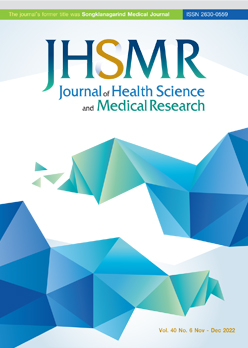Validity and Reliability of the Thai Version of the Cardiac Anxiety Questionnaire-Revised Among Thai Cardiac Patients
DOI:
https://doi.org/10.31584/jhsmr.2022870Keywords:
acute myocardial infarction, anxiety, instrument, ThaiAbstract
Objective: To translate and validate the Thai version of the Cardiac Anxiety Questionnaire – Revised.
Material and Methods: This was a descriptive statistic and exploratory factor analysis. The data collection was from March 2020 untill December 2020. From this, 213 acute myocardial infarction patients, aged from 30–59 years, who answered the questionnaire – Revised were included. The internal reliability of identified domains was evaluated using Cronbach’s alpha coefficient >0.7. An item-total correlation coefficient between 0.3 and 0.7. Factor loading ≥0.4 were acceptable as enough to establish a factor. A p-value of less than 0.050 was considered significant.
Results: The Cronbach’s alpha of the Cardiac Anxiety Questionnaire – Revised Thai version was 0.83. Item-total and inter-item correlation coefficients were also tested (r=0.21 to 0.81, r=0.00 to 0.72, respectively). Five factors that explained 65.1% of the total variance were identified. Communalities in each factor; ranging from 0.38 to 0.83. Factor 1 had four items reflecting avoidance (Items 2, 7, 9 and 12). Factor 2 had five items that captured worry and fear (Items 10, 13, 14, 15 and 16). Factor 3 had three items that captured attention (Items 1, 6 and 8). Factor 4 had two items, these two items had high factor loading (>0.80) that explained abnormal symptoms (Items 3 and 4) and factor 5 had four items that reflected safety and seeking (items 5, 11, 17 and 18)
Conclusion: The reliability and validity of the Thai version of the Cardiac Anxiety Questionnaire – Revised was suitable to measure anxiety in Thai acute myocardial infraction patients.
References
Albert CM, Chae CU, Rexrode KM, Manson JE, Kawachi I. Phobic anxiety and risk of coronary heart disease and sudden cardiac death among women. Circulation 2005;111:480-7.
Frazier SK, Moser DK, O’Brien JL, Garvin BJ, An K, Macko M. Management of anxiety after acute myocardial infarction. Heart & Lung 2002;31:411-20.
Roest AM, Martens EJ, Denollet J, de Jonge P. Prognostic association of anxiety post myocardial infarction with mortality and new cardiac events: a meta-analysis. Psychosom Med 2010;72:563-9.
Whalley B, Rees K, Davies P, Bennett P, Ebrahim S, Liu Z, et al. Psychological interventions for coronary heart disease. Cochrane Data System Rev 2011:Cd002902.
Spielberger CD. Anxiety: current trends in theory and research. England: Academic Press; 1972.
Sandrini L, Ieraci A, Amadio P, Zarà M, Barbieri SS. Impact of acute and chronic stress on thrombosis in healthy individuals and cardiovascular disease patients. Inter J Mol Sci 2020; 21:7818.
Hunter R, Noble S, Lewis S, Bennett P. Long-term psychosocial impact of venous thromboembolism: a qualitative study in the community. BMJ Open 2019;9:e024805.
Frontiers in Immunology. Editorial: Stress and Immunity [homepage on Internet]. United Kingdom: Frontiers Media S.A. [cited 2021 Apr 13]. Available from: https://www.frontiersin.org/articles/10.3389/fimmu.2019.00245/full
Vogelzangs N, Beekman ATF, de Jonge P, Penninx BWJH. Anxiety disorders and inflammation in a large adult cohort. Transl Psychiatry 2013;3:e249.
Roest AM, Martens EJ, Denollet J, de Jonge P. Prognostic association of anxiety post myocardial infarction with mortality and new cardiac events: a meta-anal. Psychosom Med 2010; 72:563-9.
Santos JMTD. Anxiety and depression after myocardial infarction: can inflammatory factors be involved?. Arq Bras Cardiol 2018;111:684-5.
Yehuda R. Post-traumatic stress disorder. New Eng J Med 2002;346:108-14.
Eifert GH, Thompson RN, Zvolensky MJ, Edwards K, Frazer NL, Haddad JW, et al. The cardiac anxiety questionnaire: development and preliminary validity. Behav Res Ther 2000; 38:1039-53.
Hair JF, Black WC, Babin BJ, Anderson RE. Multivariate data analysis 7th ed. New Jersey: Pearson Education; 2010.
Eifert GH. Cardiophobia: A paradigmatic behavioural model of heart-focused anxiety and non-anginal chest pain. Behav Res Ther 1992;3:329-45.
Dhamani K, Richter MS. Translation of research instruments: research processes, pitfalls and challenges. Africa J Nurs Midwif 2011;13:3-13.
Rustøen T, Cooper BA, Miaskowski C. The importance of hope as a mediator of psychological distress and life satisfaction in a community sample of cancer patients. Cancer Nurs 2010 33:258-67.
Wang LY, Chang PC, Shih FJ, Sun CC, Jeng C. Self-care behavior, hope, and social support in Taiwanese patients awaiting heart transplantation. J Psychosom Resh 2006; 61:485-91.
Polsook R, Aungsuroch Y. A cross-sectional study of factors predicting readmission in Thais with coronary artery disease. J Res Nurs 2020;26:293–304.
Williams B, Onsman A, Brown T. Exploratory factor analysis: a five-step guide for novices. Australasian J Paramed 2010; 8:1-13.
Downloads
Published
How to Cite
Issue
Section
License

This work is licensed under a Creative Commons Attribution-NonCommercial-NoDerivatives 4.0 International License.
























